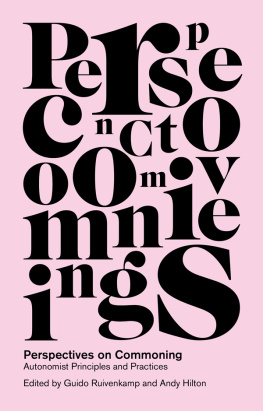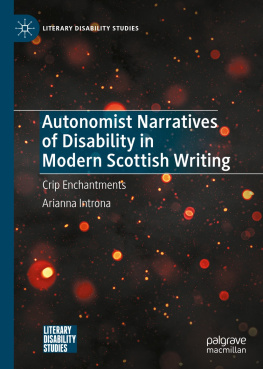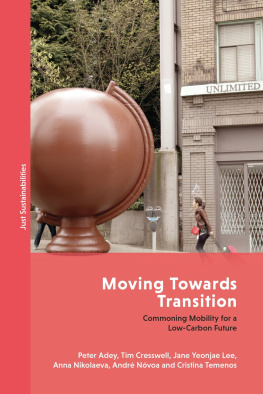Hilton Andy - Perspectives on commoning: autonomist principles and practices
Here you can read online Hilton Andy - Perspectives on commoning: autonomist principles and practices full text of the book (entire story) in english for free. Download pdf and epub, get meaning, cover and reviews about this ebook. City: London, year: 2017, publisher: National Book Network International;Zed Books, genre: Politics. Description of the work, (preface) as well as reviews are available. Best literature library LitArk.com created for fans of good reading and offers a wide selection of genres:
Romance novel
Science fiction
Adventure
Detective
Science
History
Home and family
Prose
Art
Politics
Computer
Non-fiction
Religion
Business
Children
Humor
Choose a favorite category and find really read worthwhile books. Enjoy immersion in the world of imagination, feel the emotions of the characters or learn something new for yourself, make an fascinating discovery.
- Book:Perspectives on commoning: autonomist principles and practices
- Author:
- Publisher:National Book Network International;Zed Books
- Genre:
- Year:2017
- City:London
- Rating:5 / 5
- Favourites:Add to favourites
- Your mark:
- 100
- 1
- 2
- 3
- 4
- 5
Perspectives on commoning: autonomist principles and practices: summary, description and annotation
We offer to read an annotation, description, summary or preface (depends on what the author of the book "Perspectives on commoning: autonomist principles and practices" wrote himself). If you haven't found the necessary information about the book — write in the comments, we will try to find it.
Hilton Andy: author's other books
Who wrote Perspectives on commoning: autonomist principles and practices? Find out the surname, the name of the author of the book and a list of all author's works by series.
Perspectives on commoning: autonomist principles and practices — read online for free the complete book (whole text) full work
Below is the text of the book, divided by pages. System saving the place of the last page read, allows you to conveniently read the book "Perspectives on commoning: autonomist principles and practices" online for free, without having to search again every time where you left off. Put a bookmark, and you can go to the page where you finished reading at any time.
Font size:
Interval:
Bookmark:

In Common
The architects of our lives are divided. There are those who insist that there is still no alternative to neoliberalism. Despite the many crises it has provoked, they continue to push for competition in every sphere of life, to widen the wealth gap, to ignore climate change and to pursue the steady dispossession of our rights and commonwealth.
Then there are those advocating change, those who seek to persuade us that capitalism can be saved from itself. They conceal capitalism behind a human face. They tell us that environmental disaster can be averted through technological solutions. They say that deeply rooted social injustices can be cured with a little more economic growth. That well be safer with more police on our streets.
And yet, we know that capitalism is dying, that its lies have been unmasked, that its grip on our world and our lives is maintained only through expropriations, dependency and commodified desires. In Common is a collection of works that see an end to capitalism without apocalypse. It provides us with techniques for building another world, and it narrates practices of alternatives and theories of hope. It is a glimpse into our shared present, for a future in common.
In Common is published by Zed Books under the creative commons license. You are free to share this material, transform and build upon it for non-commercial purposes.
Series editor: Massimo De Angelis
Titles already published:
Stavros Stavrides, Common Space: The City as Commons
Massimo De Angelis, Omnia Sunt Communia: Principles for the Transition to Postcapitalism
About the editors
Guido Ruivenkamp is an associate professor of sociology and anthropology at Wageningen University, and extraordinary professor at the University of Humanistic Studies in Utrecht. His previous books include Reconstructing Biotechnologies: Critical Social Analyses (co-author, 2008), and Biotechnology in Development: Experiences from the South (2008).
Andy Hilton is an EFL instructor and English language editor and proof-reader living and working in Istanbul. He has collaborated with various researchers on a number of articles and research pieces on Turkey and with Guido on the 2014 conference and handbook on knowledge and agricultural commons held in Maring, Brasil.
Perspectives
on Commoning
Autonomist Principles and Practices
Edited by Guido Ruivenkamp and Andy Hilton
in collaboration with a common pool of authors

Perspectives on Commoning: Autonomist Principles and Practices was first published in 2017 by Zed Books Ltd, The Foundry, 17 Oval Way, London SE11 5RR, UK
www.zedbooks.net
Editorial copyright Guido Ruivenkamp and Andy Hilton 2017
Copyright in this collection Zed Books 2017
The rights of Guido Ruivenkamp and Andy Hilton to be identified as the editors of this work have been asserted by them in accordance with the Copyright, Designs and Patents Act, 1988

This book is licensed under the Attribution-NonCommercial 4.0.
International Creative Commons license (CC BY-NC 4.0).
Typeset in Minion by seagulls.net
Index: Guido Ruivenkamp and Andy Hilton
Cover design: Dougal Burgess
All rights reserved. No part of this publication may be reproduced, stored in a retrieval system or transmitted in any form or by any means, electronic, mechanical, photocopying or otherwise, without the prior permission of Zed Books Ltd.
A catalogue record for this book is available from the British Library
ISBN 978-1-78699-179-9 hb
ISBN 978-1-78699-178-2 pb
ISBN 978-1-78699-180-5 pdf
ISBN 978-1-78699-181-2 epub
ISBN 978-1-78699-182-9 mobi
Contents
Guido Ruivenkamp and Andy Hilton
Mathijs van de Sande
Elise Thorburn
Sonja Lavaert
Franco Bifo Berardi
Pieter Lemmens
Massimo De Angelis
Murat ztrk, Joost Jongerden, Andy Hilton
Ruud Kaulingfreks and Femke Kaulingfreks
Jose Luis Vivero-Pol
Guido Ruivenkamp
Stefan Meretz
Glossary
The following is presented as a short listing with explanations of key terms employed in this volume, beyond those generally employed in the commons discourse (access, excludable, etc.). These are, of course, subject to revision and reformulation, as well as variations in interpretation. Listed terms used in the explanations are given in italics.
Autonomism A school of post-Marxian thought that emphasises the role of working-class struggle in shaping capitalist development focusing on the emerging, implicit possibilities of subversion, including everyday resistance to the present form of capitalism (so currently, cognitive capitalism ) and the creation of new forms of working, living and being in common. As a class-struggle Marxism, it thus stresses workers autonomy (cf. workerism ) as the guiding principle of Marxist politics (and distances itself from crisis Marxism, in which the working class figures only as victim).
Biopolitical production Derived from Foucaults notion of biopower as the extension of state power over both the physical and political bodies of a population; extended as biopolitics to the complete control of the individual life (by society as well as government), referring quantitatively to social relations and qualitatively to consciousness, intimacy, etc.; applied to production through biopolitical labour.
Capital Drawing from Marx, the conception of social relations as organised by the circulation of commodities, itself determined by appropriation (of use value, for the satisfaction of desire), leading to the expansion of value (for further desire satisfaction, but increasingly to ensure continuing appropriation of the expanding value); thus unbound, implying the control of society, by building on the extraction of surplus value produced by labour-power (also considered as a commodity, cf. the mass worker ), requiring establishment and enforcement of the constituted power ; thence, with labour intrinsically antagonistic, determining the multitude as oppositional and impelling biopolitical production .
Class composition The technical composition (the ratio of constant to variable capital) of the capitalist organisation of labour in production (where materials, tools and machines for production comprise constant capital and the labour power for this is the variable capital); shaping and shaped by the various forms of class struggle in a dynamic and antagonistic political force against capital; thus, forms of (the organisation of) class struggle as they vary with changes in its composition, according (also) to the specific configurations of capital (e.g. currently, in the period of cognitive capitalism ).
Cognitariat The (middle class) category of workers who sell their cognitive, informational, communicative and affective capacities (their knowing, creating, imagining, expressing, collaborating, etc.) to capital; a fundamental part, therefore, of cognitive capitalism .
Cognitive capitalism The (increasing) focus on immaterial production , comprising both immaterial products and material products within which immaterial elements are incorporated, particularly through informationalisation, closely related to elements of communication and affect; thus, a specification of the period of contemporary capitalism .
Constituent power ( potenza ) The power of the multitude that aims at the realisation of its potential, which is always already there as a space within capitalist structures and relations and through which these are altered.
Next pageFont size:
Interval:
Bookmark:
Similar books «Perspectives on commoning: autonomist principles and practices»
Look at similar books to Perspectives on commoning: autonomist principles and practices. We have selected literature similar in name and meaning in the hope of providing readers with more options to find new, interesting, not yet read works.
Discussion, reviews of the book Perspectives on commoning: autonomist principles and practices and just readers' own opinions. Leave your comments, write what you think about the work, its meaning or the main characters. Specify what exactly you liked and what you didn't like, and why you think so.









